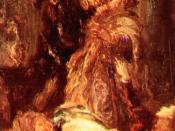The first part of the theory is that of Divine Intervention - this being the easier of the two parts to explain.
This works off the idea that some manner of God or All-Powerful Force does actually exist. Divine Intervention is, therefore, the notion that this God can manipulate the world either through direct or indirect action.
In the text and film, for instance, the Ghost comes as a messenger from this God, motivating Hamlet to do its will. This is both an example of direct divine intervention - in the appearance of the Ghost; and indirect divine intervention - as the God uses Hamlet to carry out its deeds.
The second part of the concept is the Natural Order of the world. This can be brought down to its base form as: 'What is supposed to happen.' Unfortunately, it isn't that simple. The Natural Order exists always, however is not always followed.
This 'breaking away' from the Order is usually the result of Human Intervention, developing one of two outcomes.
These are: either the Natural Order is re-aligned, or the world remains a corrupt and terrible place until such time as the first outcome is realised. So, the world is repaired, or an unending loop of badness ensues until it is.
In the play, the Order was broken when Claudius killed King Hamlet, and from the opening lines the 'wrongness' that lingers in the air is noted, setting the mood for the remainder of the play: "...'tis bitter cold and I am sick at heart." (I,1,8-9) said Francisco as he was relieved from watch-duty. Also, in the film, these words are greatly aided in their purpose by the images of snow-covered Denmark. Another line, in the fourth act: "something is rotten in the state of Denmark" (I.4.67) reaffirms...



What Film?
What film is this?
0 out of 0 people found this comment useful.